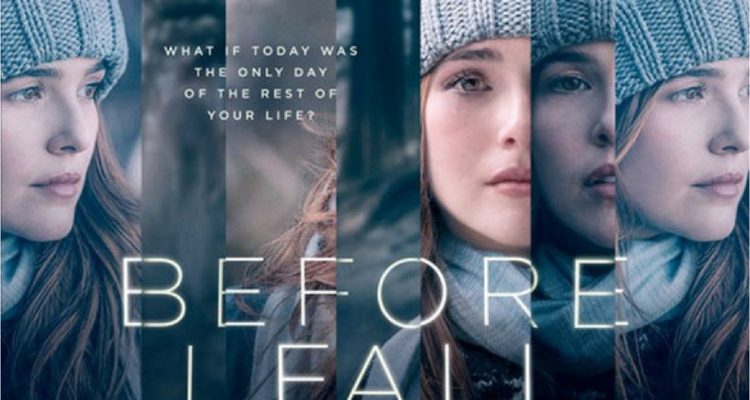The Book
I put off reading Before I Fall, a young adult novel by Lauren Oliver, because I knew it was about a dead girl. Dead sounded depressing. When I finally cracked it, I was further disheartened to find that I hated the main character. Samantha (Sam) is the preeminent mean girl of her high school. Did I really want to spend hundreds of pages with the type of girl who’d humiliate another at a pool party (with feminine products, no less)? I thought the book should come with a junior high nightmare trigger warning.
Of course, it’s good I didn’t let my initial prejudices win out.
Sam is one of the most popular girls at her school, but it’s not because she’s well-liked. It’s because she and her friends reign through fear. She will not deign to speak to underclassmen, she’s actively rude to a childhood admirer, she manipulates people into doing her favors, and she terrorizes a shy girl with depression. She’s the worst. Yet, I can’t help but be fascinated by the careless cruelty this posse inflicts upon others—totally guilt-free. They don’t even realize how horrible they are. When Sam dies in a drunk-driving accident after a party, it feels like just desserts. She had it coming.
Nonetheless, despite dying on an icy road the night before, Sam’s alarm goes off like normal the following morning. Her friends carry on the same conversation on the way to school as they did the day earlier. She receives the same pop quiz, and people enter her life in the hallway or cafeteria at the exact time they did the day before. It takes her a while to realize she’s reliving the day of her death over and over again. As she does, she takes stock of her actions, and for the seemingly first time, reflects on her life and the consequences of her behavior.
Sam is a dynamic character in this book and waiting for and watching her change kept me turning pages. She needed to look at herself critically, and the author managed this without moralizing. Sam eventually realizes that small choices have ripple effects on the lives of others, and as she continually wakes to the same day each morning, she’s able to change its outcome by making different decisions. Some are good, others disastrous. Despite living the same day with her multiple times, the pacing is fast. It was like one of those Choose Your Own Adventure books. The underlying tension is always, what will happen this time?
The best part of the book is that it’s about a life examined. In fact, that’s why I like YA books in general—even the fluffiest turn inward to some degree. It’s that age. Everything is imbued with meaning and answers are just out of reach. I wondered how the film makers would handle internal turmoil on screen as well as the challenge of making the repetition of living the same day not feel tiresome.
The Movie Version
Before I Fall as directed by Ry Russo-Young is a beautiful, high-quality film. The setting, sound track, and cinematography are all spot-on. The story was brought to life in a magical way in the sense that the written word came into being—it felt real. The car wreck was jarring (I got chills), and other high-emotion scenes delivered. Overall, the pacing worked.
The element I’m most critical of is casting and characterization even though all of the actors did a good job, and some of the casting was perfection (i.e., Halston Sage). Sage nailed Sam’s best friend, Lindsay. She’s hot, she’s mean, and she’s fun. You’ll simultaneously hate her and wish she was your best friend—as it was meant to be. Lindsay is never wholly boxed into villainhood either. Each time she does something practically indefensible, she reveals enough vulnerability to make the viewer sympathize long enough to forgive. The Lindsay I conjured as a reader is who showed up on screen.
Zoey Deutch’s Sam, on the other hand, is a different story. The movie Sam doesn’t have the same bite that she has in the novel. She’s too sweet, too doe-eyed, too passive, and worst of all: you can tell she’s actually really nice right from the beginning. Her friends are sexy, confident, indifferent and by contrast, Sam seems like their mascot. She doesn’t exploit the power of her popularity. She even seems destined to fall for her nerdy admirer. I think the role as written for Deutch did her a disservice. The screenwriters were too conservative. They didn’t think the audience would go for a bitch.
However, the key to this story—it’s theme, thesis, and the reason to turn to the page—is to see if Samantha Kingston is capable of change. We want to watch the evolution. We wonder if she’ll ever “get it.” Can she discern value? Can she care about someone at the bottom rung of popularity? Will she put her own status—and much more—in jeopardy to do it? It’s not that Sam in the movie doesn’t have room to grow, it’s that she’s practically already there.
This criticism will likely only burden those who read the book and are comparing (as I actively was). Don’t let it keep you from a thoughtful, well-produced movie that asks its teenage protagonist—and maybe all of us—to imagine how we might do things over, if given the chance.
Q: How do you think the movie compared to the book?


